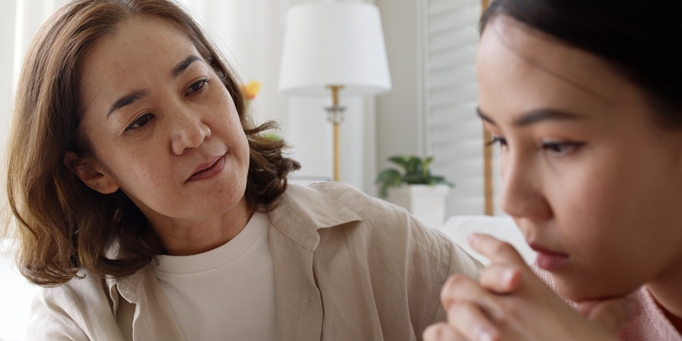
My Christian child is same-sex attracted
Advice for the Church and for parents.
You may think, as I did, that this is not something likely to ever effect your family. You’d be wrong. If you’re a member of Christ’s Church, this affects your church family. So you need to inform yourself and think through the issues—and your response—carefully.
As you consider how to support same-sex attracted Christians, please be aware that in some jurisdictions within Australia, it can be legally problematic to express (through conversation or prayer) anything other than immediate and unqualified affirmation of a person’s sexuality, even if that person consents to the conversation or prayer. Some more information about this kind of legislation can be found here.
To the Church
As a Christian parent, it was hard to hear my daughter’s revelation. I believe what the Bible says about marriage being a sacred union between one man and one woman, and so hearing that my child is tempted to a different lifestyle was hard, and hearing how difficult this is for my child has also been heartbreaking.
Unfortunately, there’s also been an unexpected source of pain: the Church. When my daughter first told me how she was feeling, one of the first things she did was to beg me not to tell particular Christian relatives and friends. Of course, it’s completely reasonable that she does not want everyone to know the details of her personal life and struggles. But the terrible thing is, she doesn’t want these people to know because of the attitudes they’ve expressed in the past.
I’m confident that if these people were told, they would be quick to express compassion towards my daughter, but, having heard them make countless off-hand derogatory, dismissive and condescending comments about same-sex attracted people in the past, their expressions of care would be a bitter pill to swallow.
Brothers and sisters, I urge you to consider how you speak about same-sex attracted people. Statistically, Christians that you know and love are among them. These are our siblings, our friends, our nieces and nephews, our children. These are men and women in our growth groups and pews and youth groups. Same-sex attracted people are not ‘them’, they are ‘us’.
Have your words been a blessing to these members of our church family or have they caused shame and alienation? Has your attitude prevented your brothers and sisters from coming to you for support and prayer? Crucially, have you positioned yourself as someone your own children can come to if they find themselves same-sex attracted?
As Christian parents, consider the example that your words, tone and actions are setting for your children. Are you modelling compassion and grace? If your child’s Christian friend told them they were struggling with same-sex attraction, would your child know how to love them well, based on the ways they’ve seen you love, and the words they’ve heard you speak?
We must not use derogatory terms. We must not snicker at homophobic jokes. We must not relate to same-sex attracted people, whether Christians or not, as stereotypes, or assume that their sexuality makes them a certain type of person, any more than we can assume people who are tempted by materialism are ‘all the same’.
Please, ensure that when you speak about same-sex attracted people you do so with compassion and respect, recognising as you do that ‘No one is righteous, not even one’ (Romans 3:10).
Not even you.
If your child, or any fellow believer shares their experience of same-sex attraction with you, praise the Lord for their honesty, and ask him for wisdom and compassion as you support them. Pray for them. Pray with them. Seek resources and work through them together. And remember that this one aspect of their life is not the only aspect of their life. Christians struggling with same-sex attraction need to grow in love and obedience as they meet God in the Bible and become more like Jesus—exactly what every Christian needs.
These fellow Christians are walking a very challenging path, facing the possibility of a lifelong temptation, and the likelihood that marriage and a nuclear family, so prized in our churches, will not be a reality for them. Pause and consider this. How can you support and care for them?
As I’ve been walking this path, I have been considering the way we, Christ’s Church, have managed to understand homosexual practice to be a sin in a category all on its own. Why do we feel so differently about homosexual sin than we do about fits of rage, for example? The Bible is clear that both are sin. Why can we joke about being impatient in traffic, or coveting our neighbour’s new car, but have somehow made same-sex attracted people ‘others’ to whom we cannot relate with compassion?
This perhaps stems partly from our cultural and historical background, partly from the unfamiliar nature of the temptations (although most honest Christians will confess to experiencing lust), but mostly because of our tendency to see things through a Pharasaical lens of self-righteousness. Often, like the Pharisee in Jesus’ parable, who prayed ‘God, thank you that I am not like other people’ we can see other people’s sin more clearly than we can see our own (Luke 18:9–14).
It's easy to verbally or intellectually agree that we are all sinners, but does your behaviour towards same-sex attracted people reveal a heart of humility and a deep understanding of God’s grace, or a heart of self-righteousness? Satan will delight in using our failure to love same-sex attracted people well to drive people away from Christ’s Church. But if we learn to love as Jesus did, God will use us to care for same-sex attracted Christians, and he will use his broken but faithful Church to draw unbelieving same-sex attracted people into his family.
To the parents of a same-sex attracted child
Dear brothers and sisters, I cry with you. This is not where we thought the path would go, is it? I can only offer you my own unfinished thoughts as I journey through this:
1. Express your love and compassion.
This probably goes without saying, but tell your child you love them, that you recognise how difficult this must be, and assure them of your ongoing support. If you’ve been guilty of making homophobic comments or adopting a hostile attitude towards same-sex attracted people in the past, then you will need to acknowledge the hurt this will have caused and ask your child’s forgiveness for this. Pray with your child. Pray for your child. Pray God will grant you a kinder heart.
2. Be clear about your theological position, if you’ve not done so already, and then stop.
Resist the temptation to continue reminding your child what God's design for sex and marriage is, if you know they already understand this. They haven’t forgotten, and they haven’t chosen to be tempted in this way. Your child is being tempted to choose earthly things rather than Christ, and the battle is a spiritual one. God needs to work in your child’s heart to bring about steadfast faith and obedience—you cannot ‘convince’ them to no longer face this temptation. Remember that expressing compassion and care for your child and their struggle does not imply approval for homosexual practice.
3. Seek support.
Tell a trustworthy Christian friend. If your child is a Christian, encourage and help them to also confide in a wise and kind Christian friend or pastor. Being able to freely share my worries and seek advice from friends has been a great blessing to me. It can feel very lonely to be dealing with concerns and grief that are, to a large extent, taboo in the church. You will need loving brothers and sisters around to pray with you, listen to you, and care for you as you care for your child and seek to keep growing in your own faith.
4. Don’t jump to conclusions or get carried away with ‘what ifs’.
It’s easy to make assumptions based on our own experiences and what the media tells us, or to get caught up with our own imaginings of what the future might hold for our child. Instead, ask questions. Find out what support your child wants. Learn from them—what is this struggle like for them? How is God teaching them? What do they want you to pray for? I know my own mind has been caught up worrying about what the future might hold for my daughter, and I’ve been impatient to try to ‘solve’ things in my clumsy, human ways. But this journey is my daughter’s and God’s, and I’m learning that it may be a long one. I’m praying I’ll have wisdom and grace as I’m privileged to walk alongside her.
Resources
Websites:
These organisations are seeking to support Christians who experience same-sex attraction and to equip churches to live out God’s word on sexuality and identity.
There are personal stories and articles to read, podcasts to listen to, and courses to work through. These resources are for same-sex attracted people, their families, and the wider church family.
Center for Faith, Sexualty & Gender
Living Out
Living Faith
Books:
Ed Shaw, The Plausibility Problem: The Church and Same-Sex Attraction
Sam Allberry, Is God Anti-Gay and Other Questions About Jesus, the Bible, and Same-Sex Sexuality
Sam Allberry, 7 Myths About Singleness
Jackie Hill Perry, Gay Girl, Good God: The Story of Who I Was and Who God Has Always Been
For more articles from Growing Faith, subscribe to our monthly e-newsletter.
To hear about the latest books and resources from Youthworks Media, subscribe here.








